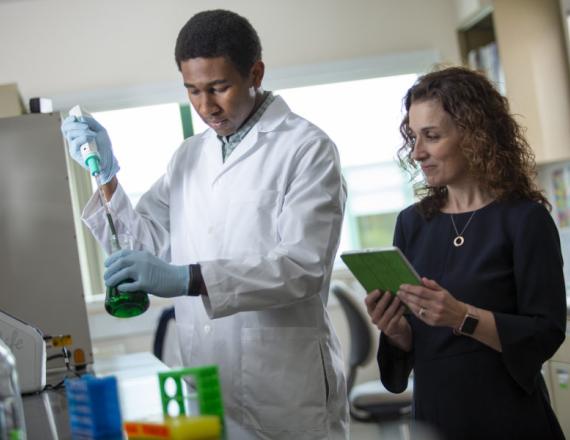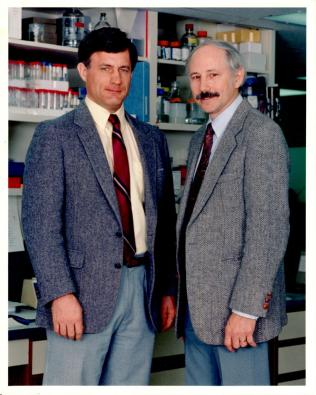$3.35M in Gifts Fuel Immunotherapy Research
Three new gifts, totaling $3.35 million, will advance cancer immunotherapy research and teaching at Dartmouth’s and Dartmouth-Hitchcock’s Norris Cotton Cancer Center (NCCC). The gifts will help accelerate the development of multiple, promising, next-generation immunotherapies, which harness a patient’s own immune system to fight cancer.

“These drugs take the brakes off the immune system and allow it to recognize, treat and cure a cancer, just as it would an infection,” says Steven Leach, MD, director of NCCC and the Preston T. and Virginia R. Kelsey Distinguished Chair in Cancer at the Geisel School of Medicine at Dartmouth. “However, current immunotherapies benefit only a small fraction of patients with cancer. That’s why our Cancer Center is focused on developing the next generation of immunotherapies.”

Paul Guyre, PhD, (left) with Medarex co-founder Mike Fanger, PhD, circa 1989.
Part of Dartmouth College’s The Call to Lead Campaign, the Cancer Center and immunotherapy research are top fundraising priorities for Geisel. Learn more about Geisel’s campaign.
These recent gifts were made by Veronica Guyre and Paul Guyre, PhD, a pioneering immunologist, entrepreneur, and emeritus professor of microbiology and immunology at Geisel; Bob Barber, whose wife, Esther, was treated at NCCC ; and Justin Gmelich and Victoria Hall Gmelich, a 1991 graduate of Dartmouth College.
Paul Guyre, PhD, is a lifelong researcher and cofounder of the company Medarex, which developed the first successful immunotherapy drugs for cancer. The Guyres’ gift will provide the Cancer Center with immediate, flexible funding to rapidly scale up its preclinical and early phase clinical trial capacity and to invest in the development of several high-potential areas of immunotherapy research.
Unlike chemotherapy, which uses powerful drugs that can have painful, lasting side effects, immunotherapies engage the body’s immune system to battle cancer cells. Immunotherapies can be less risky, more effective and easier to tolerate for patients.
The hope for better cancer treatments and a desire to help as many people as possible inspired Barber to establish the Robert L. and Esther T. Barber Cancer Immunotherapy Research Current-Use Fund.
“I felt that if I could assist Dartmouth in these new therapies that could supplant chemotherapy and other debilitating treatments, that would mean a great deal to me and my family,” says Barber. The Gmelich family’s gift will establish the Victoria Hall Gmelich 1991 and Justin G. Gmelich Professorship, supporting Geisel faculty focused on teaching and/or research in the areas of immunology or oncology. Justin and Victoria have been longtime supporters of both education and medical research. The Gmelichs are founders of the all-girls STEM high school, Trinity Hall.
Building on a history of excellence
Dartmouth scientists, like Guyre, have been at the forefront of cancer immunotherapy for decades. Medarex, the company that Guyre cofounded with Dartmouth researchers Michael Fanger, PhD, and Edward Ball, MD, went on to develop the first successful blockbuster cancer immunotherapy drugs. Since then, 14 biomedical startups have had their roots in the Cancer Center, several of them focused on immunotherapy.
Guyre’s colleagues continue to be on the leading edge of cancer immunotherapy. One treatment, now in early clinical trials, is based on research by Dartmouth immunologist Charles Sentman, PhD. His team created a unique form of engineered white blood cells, called CAR T-cells, which can target up to 80 to 90 percent of human cancers and can be compatible with any patient.
Another treatment in clinical trials is based on discoveries by Randolph Noelle, PhD, the Thomas S. Kosasa, MD, Professor at Geisel and co-founder of ImmuNext. That treatment is based on a checkpoint regulator called anti-VISTA. A combination of federal grants, institutional and community support, and private philanthropy fueled the early research for both therapies. “Philanthropy will help the next generation of scientists take bigger risks and innovate more quickly,” says Guyre. As he knows firsthand, wise and bold scientific risk-taking is often what leads to the most transformative breakthroughs.